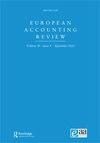Stakeholder Focus or Strategy Focus? An Eye-Tracker Study on the Effect of Presentation Format on Nonprofessional Investors’ Information Processing Patterns
IF 2.7
3区 管理学
Q2 BUSINESS, FINANCE
引用次数: 0
Abstract
Using eye-tracking technology, we examine whether the information processing patterns of nonprofessional investors with a directional investment preference are affected by performance information presented based on either a focus on stakeholders (stakeholder format) or on strategic goals (strategic theme format). We find that when a company’s financial performance has declined but nonfinancial performance has improved, a strategic theme (stakeholder) format causes investors in a long investment position to focus on negative financial information to a lesser (greater) extent than those in a short investment position. These results indicate that a strategic theme format encourages biased investors to draw on favorable nonfinancial information to support their position, whereas a stakeholder format causes them to closely scrutinize unfavorable financial information. We also find that the level of bias in investors’ earnings forecasts is lower when information is presented in a strategic theme format than in a stakeholder format; however, a supplementary experiment finds that this result is reversed when a company’s financial performance has improved but its nonfinancial performance has declined. Our results have implications for external report preparers, standard setters, and analysts.关注利益相关者还是关注战略?陈述格式对非专业投资者信息加工模式影响的眼动仪研究
利用眼动追踪技术,我们研究了具有方向性投资偏好的非专业投资者的信息处理模式是否受到基于利益相关者(利益相关者格式)或战略目标(战略主题格式)的绩效信息的影响。我们发现,当公司财务业绩下降而非财务业绩改善时,战略主题(利益相关者)格式导致多头投资头寸的投资者对负面财务信息的关注程度小于(大于)空头投资头寸的投资者。这些结果表明,战略主题格式鼓励有偏见的投资者利用有利的非财务信息来支持他们的立场,而利益相关者格式使他们仔细审查不利的财务信息。我们还发现,当信息以战略主题格式呈现时,投资者收益预测的偏差水平低于以利益相关者格式呈现的水平;然而,一项补充实验发现,当公司的财务绩效有所改善而非财务绩效有所下降时,这一结果是相反的。我们的研究结果对外部报告编制者、标准制定者和分析师都有启示意义。
本文章由计算机程序翻译,如有差异,请以英文原文为准。
求助全文
约1分钟内获得全文
求助全文
来源期刊

European Accounting Review
BUSINESS, FINANCE-
CiteScore
7.00
自引率
6.10%
发文量
58
期刊介绍:
Devoted to the advancement of accounting knowledge, it provides a forum for the publication of high quality accounting research manuscripts. The journal acknowledges its European origins and the distinctive variety of the European accounting research community. Conscious of these origins, European Accounting Review emphasises openness and flexibility, not only regarding the substantive issues of accounting research, but also with respect to paradigms, methodologies and styles of conducting that research. Though European Accounting Review is a truly international journal, it also holds a unique position as it is the only accounting journal to provide a European forum for the reporting of accounting research.
 求助内容:
求助内容: 应助结果提醒方式:
应助结果提醒方式:


